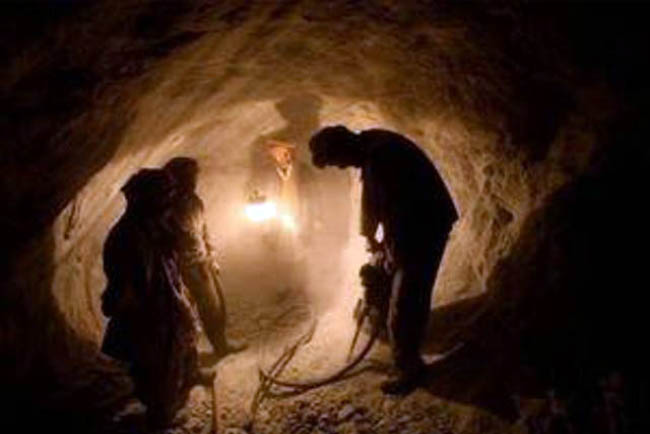FAIZABAD - All mines in northeastern Badakhshan province are illegally extracted by armed men and militants as the government collected no revenue this solar year from mining in the province.
Local officials say revenue of the provincial Mines Department was zero this year and all income from the natural resources went to pockets of powerful figures and the Taliban.
They warn the Mines Department would be shut if the government did not take action to prevent the illegal mining.
Mohammad Haidar, financial and administrative manager at Badakhshan Mines Department, told Pajhwok Afghan News: “We shared our plans about mining contracts with the private sector section of the Ministry of Mines and Petroleum this year, but no action has so far been taken on our plans.”
He said mines revenue in Badakhshan was zero because of suspension of contracts and no endorsement of new contracts this year.
He added the lapis lazuli mine in Karan wa Menjan district of Badakhshan was also being extracted by illegal armed men who trafficked it through central Panjsher province.
“In 1394 solar year, we collected around six million afghanis in revenue, in 1395 the amount was about five million afghanis, but we have zero revenue this year due to suspension of contracts with the private sector until second order,” he said.
Haidar said around 10 tons of lapis lazuli belonging to traders remained locked in Juram, Baharak and Faizabad districts following a presidential order. He said the traders suffered huge losses as a result of the lapis lazuli lock. These traders are still not allowed to take the stone to market for sale, he added.
Mohammad Hanif, a trader of lapis lazuli stone in Badakhshan, said: “I purchased one tone of lapis lazuli three years ago, but a presidential delegation locked it in a depot, I had invested all my money in that.”
He said he owed money to local people and suffered a lot of losses due to the locking of his investment. “I do not know where to go and to whom I should complain.”
A provincial council member, Abdullah Naji Nazari, told Pajhwok that two major lapis lazuli and gold mines were under control of militants and powerful figures and they were illegally extracting the riches. He said militants took their share from the income.
A number of small mines that contain precious and semi-precious stones are extracted by local people and powerful figures and then trafficked to Pakistan and Dubai, he added.
Nazari said local people who were not professionals worked for months in the mines but they rarely found anything. “If they find something, they sell it at low prices.”
The government and local administration have no concern about protection of mines in Badakhshan, he complained.
He suggested the mines department should sign contracts with the private sector for extraction of mines so that the government could earn revenue.
“We have so many mines, if their revenue is legally collected, it would help develop Badakhshan province,” he said.
According to Eng. Sanaullah, general manager of geo-science in Badakhshan mines department, 38 mines, including precious stones and metals, exist in the province. He cited primary surveys done by professional personnel of the department.
He said these mines included gold, lapis lazuli, tourmaline, ruby, aquamarine, coal, mica, iron, emerald, sulfur, copper oxide, marble, phosphate, serpentine and zinc which are currently extracted by militants or powerful figures.
However, Mines and Petroleum Ministry spokesman, Abdul Qadir Mutfa, said that the ministry had developed a new roadmap for accountability, transparency and utilization of natural resources.
He said one important point in the roadmap was management of contracts and discussion of the contracts in the Economy Council and the Presidential Palace for more accuracy.
“We have two types of contracts, small, vocal and big contracts, in small contracts, suggestions are sent from the mines and petroleum ministry to the Economic Council, but there is still no final decision in this regard as to when to start small contracts,” he said.
Mutfa said the ministry was trying to sign contracts as soon as possible because the government’s revenue source was mines.
Calling illegal extraction of mines a major challenge, he said that the Ministry of Mines and Petroleum used to share its reports of mines monitoring with security organs and security forces had devised special measures for protection of natural resources.
But he acknowledged monitoring, prevention of allegation extractions and trafficking was difficult in areas under militants’ control.
Badakhshan is a mountainous province and is rich in natural resources, particularly gold, ruby and lapis lazuli. The province shares border with China, Pakistan and Tajikistan.
Local officials believe legal extraction of mines would contribute to high revenue collection besides creating job opportunities for thousands of people. (Pajhwok)
Home » Afghanistan » Illegal Extraction of Badakhshan Mines Goes on
Illegal Extraction of Badakhshan Mines Goes on

